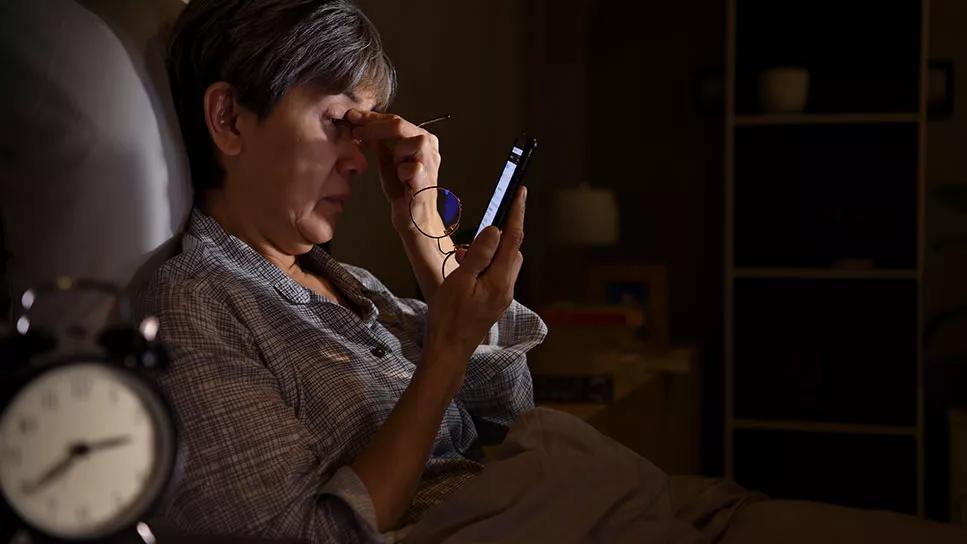Hormone changes can definitely leave you tossing and turning at night, but help is available

Image content: This image is available to view online.
View image online (https://assets.clevelandclinic.org/transform/487ae18a-00c7-469e-8aa9-54e8da99dc3a/Menopause-Insomnia-1295883842-967x544-1_jpg)
Older woman awake in bed in the middle of the night looking a smartphone
If your sleep quality has gone down the tubes in your 40s, you’re not alone. In the years leading up to menopause, hot flashes and other changes can leave you lying sleepless night after night.
Advertisement
Cleveland Clinic is a non-profit academic medical center. Advertising on our site helps support our mission. We do not endorse non-Cleveland Clinic products or services. Policy
“Nearly every day, I speak to women with midlife sleep problems,” says Ob/Gyn Julia Girzhel, MD.
Midlife hormone changes can prevent you from getting enough shut-eye. And poor sleep can affect almost every part of your life. Dr. Girzhel explains why you may be sleeping poorly and how to get the relief — and quality ZZZs — you need.
“Menopause” is often a catchall term that describes several years of hormone changes that women experience in their 40s and 50s. There are three stages of menopause: perimenopause, menopause and postmenopause.
Menopause is official when you’ve gone 12 months without a menstrual period. Perimenopause is the time leading up to menopause, and it can last for several years — as many as 10. During perimenopause, you may experience a rollercoaster of hormonal ups and downs as your estrogen and progesterone fluctuate.
All of these hormone changes can lead to physical symptoms that seriously interrupt your sleep. If you’re feeling this, you’re not alone: 40% to 60% of women going through menopause report sleep problems.
Estrogen is a hormone that affects many body systems. In addition to playing a role in your menstrual cycle, it protects heart, bone and brain health. It also helps boost your sex drive and mood. As you approach menopause, your estrogen levels start to drop.
Advertisement
“Estrogen typically doesn’t directly affect your sleep,” clarifies Dr. Girzhel. “But a significant decrease in estrogen brings on hot flashes, and those can definitely disrupt sleep.”
“Night sweats are hot flashes that happen at night,” explains Dr. Girzhel. “You may have hot flashes during the day. Or you may not notice any hot flashes during the day but have them mostly at night.”
Hot flashes are a common symptom during perimenopause. They can be mild or intense, and you may experience:
If you’ve had night sweats, you’re probably familiar with the cycle that can make a good night’s sleep nearly impossible. First, you overheat and wake up in sweaty clothes and sheets. You throw the covers off to get some relief. Later, you wake up cold, so you cover up. Another hot flash starts the whole sweaty, frustrating cycle all over again.
Night sweats aren’t the only potential midlife sleep disruptor. Bladder changes are also common, which can lead to nighttime trips to the bathroom. In perimenopause and beyond, you’re more likely to have:
Menopause aside, insomnia becomes more common as you get older. As you age, it often becomes more difficult to fall asleep, stay asleep and get quality deep sleep.
Even worse, “Poor quality sleep can lead to more symptoms, as well as anxiety about not being able to sleep,” says Dr. Girzhel.
And that can make it even harder to fall and stay asleep. But have hope because there is help.
Menopause insomnia treatment depends on what’s causing your sleeplessness and how much it’s impacting your life.
If the insomnia is mainly due to hot flashes, hormone replacement therapy (HRT) may be your best bet. “Many women see great results with hormone replacement therapy,” says Dr. Girzhel.
HRT may not directly help with nocturia, but if you’re sleeping better, you may sleep through some of your nighttime bathroom urges. There are specific treatments for nocturia, so talk to a provider if your bladder is keeping you up at night. You can also make lifestyle changes to stop peeing so much at night, such as elevating your legs during the day and limiting caffeine.
These strategies may give you menopause insomnia relief:
Advertisement
“It’s OK to use over-the-counter sleep aids occasionally,” says Dr. Girzhel. “However, you shouldn’t take them long term.”
Talk to a healthcare provider if you find you’re relying on sleep aids too much or you’ve tried lifestyle changes and still can’t sleep soundly. They can discuss other treatment options with you that will help you get a restful night’s sleep.
Advertisement

Sign up for our Health Essentials emails for expert guidance on nutrition, fitness, sleep, skin care and more.
Learn more about our editorial process.
Advertisement
Estrogen loss contributes to bone loss, which significantly raises your risk of osteopenia and osteoporosis
Making certain changes to your diet, sleep habits and even your wardrobe may help lessen the impact of menopause symptoms
A women’s health specialist explains those cold flashes that come on quickly
Changing hormone levels can bring issues like brittle nails, indigestion, dry skin and new allergies (to name a few!)
The choices you make at mealtime could reduce hot flashes or make them worse
If you’ve noticed changes in your mood and mental health while going through menopause, you’re not alone
Missed periods, heavy periods, painful sex and frequent hot flashes are just a few symptoms worth discussing with your provider
At-home tests measure FSH levels in urine, but they can’t actually diagnose menopause
Although it could be used as a moisturizer, this new trend is not recommended
Communicating clear limits helps protect your time, energy and emotional well-being
High cholesterol can be genetic, but testing and treatment can lower your heart disease risk